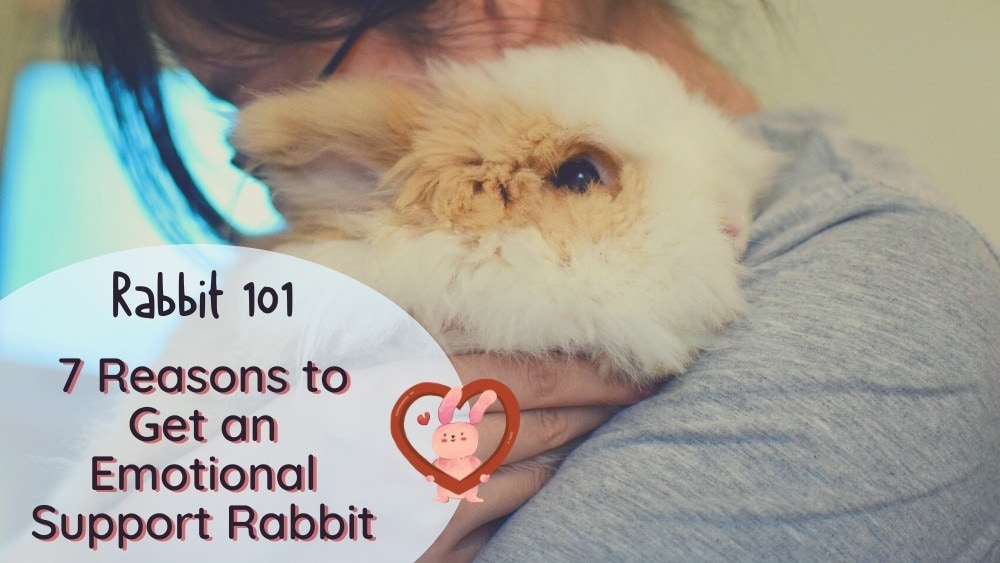When the chaos in your world feels overwhelming, watching a rabbit go about its daily business is incredibly peaceful. A rabbit’s needs are simple – hay, playtime, and pettings – and if they are met, the bunny becomes contently absorbed in its own world.
This is why rabbits make excellent emotional support animals. Bonding with a bunny gives you the chance to disengage from a more complicated existence and find calm in the simple, happy realm of snuggles and binky jumps.
Can You Get an Emotional Support Rabbit?
Rabbits absolutely can become certified emotional support animals. In fact, they serve this purpose well. Rabbits are quiet, tidy, and happy animal friends that live 8 years or more. Any breed of rabbit can become an emotional support pet – from the 2-pound Netherland Dwarf to the 20-pound Flemish Giant.
All you need for your rabbit to become a certified emotional support pet is a letter from a physician stating that you have an emotional or mental disability and that pet therapy is prescribed as part of your treatment. This letter allows you to approach landlords and ask them to make special exemptions for your emotional support rabbit.
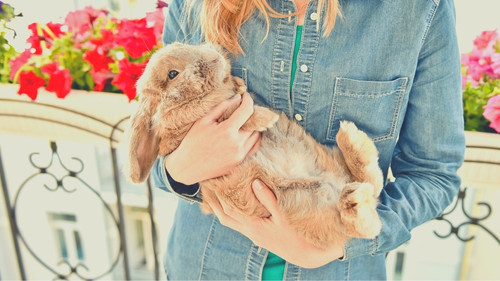
7 Reasons to Get an Emotional Support Rabbit
1 – Rabbits are Quiet and Happy
Rabbits don’t bark, whine, or make loud and demanding noises. This makes them great pets for those who need some peace after coming home from a boisterous work environment or those with auditory sensitivities.
Instead of squawking or yapping, rabbits make a handful of subtle but sweet noises like clucking, clicking, and even purring! You’ll come to associate the steady, soft sound of a rabbit chewing his hay with tranquility and satisfaction.
2 – Rabbits are Tidy
Make no mistake – rabbits do poop a lot. But their poop is dry, inoffensive, and relatively easy to clean up. Rabbits can be trained to use a litter box, so they’ll do their business in one corner and leave the rest of your home clean.
Rabbits take great pride in their personal hygiene. They spend a big chunk of each day grooming themselves by licking every inch of their fur. In most circumstances, they don’t need their owners to give them baths. In fact, full-submersion baths are dangerous for bunnies!
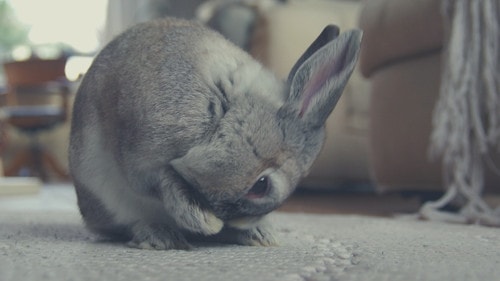
Rabbits molt – or shed a full coat – once or twice a year, depending on the climate and their genetics. If you have a large breed, like a Flemish Giant or a Satin, you will definitely need to vacuum the hair off your carpet while they are molting. But if you have a small breed – especially a hypoallergenic one such as the Mini Rex – you may not even notice the fur around your home. Grooming your rabbit with a silicone brush like Kaytee Pro-Slicker Brush, once or twice a week will help reduce the loose hair flying around the bunny room.

The biggest mess you’ll encounter with a rabbit is hay that inevitably spreads around the bunny’s play area. Offering compressed hay cubes rather than loose hay can help reduce the mess.
3 – Rabbits Live 8+ Years
An emotional support animal isn’t just a pet; it’s a friend. Bonding with a fellow creature can help you overcome grief when struggling with a loss of a job, a broken relationship, or other misfortunes. So you hope that your emotional investment in befriending an animal will lead to a long-term relationship.
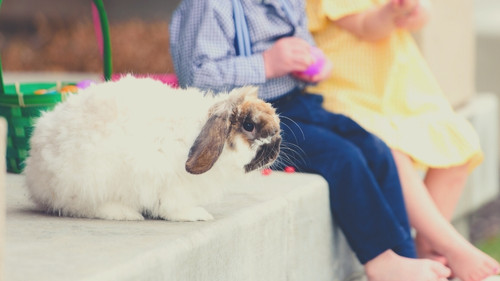
Thankfully, a multi-year relationship is possible with an emotional support rabbit. Bunnies that are kept indoors and given proper preventative healthcare usually live at least 6-7 years.
The average lifespan of a pet rabbit that’s had a high-quality life is actually closer to 8-10 years.
So if you rescue a younger rabbit, there’s a good chance that it will be there to help you through whatever the next decade has to bring.
4 – A Rabbit’s Needs Are Simple
Wondering what it takes to care for a rabbit, and if it’s as much work as a cat or a dog?
Rabbits do need daily time and attention, but their needs are relatively easy to meet. They need fresh hay, pellets, water, and vegetables every day. They need time to exercise and personal attention from their owners and/or another bunny. They need their litter box cleaned. And that’s about it!
While rabbits enjoy getting outside to romp in the grass, it’s not strictly necessary for them to go outdoors if they have high-quality grass hay to eat and plenty of indoor playtime. Since they don’t need to go on daily outdoor walks, this makes them an option for housebound individuals.
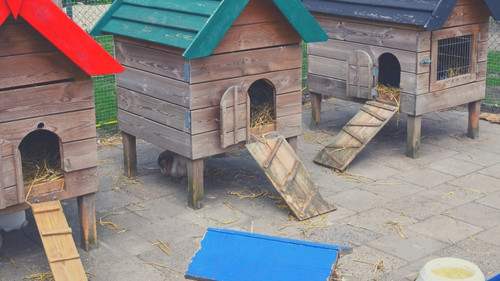
Rabbits’ healthcare needs are also simple. Pet rabbits should be spayed or neutered. This not only makes them more friendly but helps prevent their lives from being cut short by cancer.
In some countries, rabbits need to be vaccinated against viruses called RHVD or Myxomatosis. However, these diseases are not transmittable to humans. In fact, there are only a few zoonotic diseases that can pass between humans and rabbits. (Rabbits don’t even contract rabies!)
5 – Rabbits Can Live in An Apartment or Small Home
Rabbits have two major requirements for housing: safety and room to run. They need both an enclosed hiding space where they can retreat for security, and a large open space where they can hop, dash, and do their little bunny dances.
Claims that “rabbits don’t need much space” are untrue if “not much space” means a 2-foot-square cage that the rabbit never leaves. However, you can keep a pet bunny in the smallest of homes if the rabbit has access to a spacious playpen. Even a studio apartment is large enough for a rabbit if it’s allowed free-range of the apartment. This means rabbits can live happily in homes that are too small for dogs.
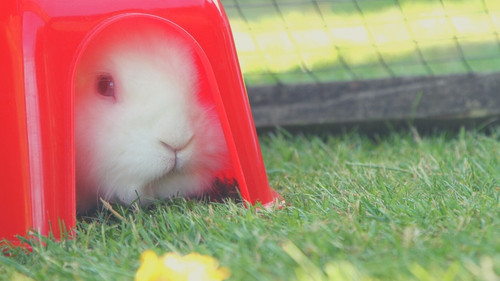
6 – Rabbits Are Affectionate
So, okay, you’re thinking: Rabbits are easy to care for. And they top the cuteness charts. But are rabbits as sweet as they look? Are they affectionate pets that can truly provide emotional support?
Yes, absolutely.
A rabbit’s temperament depends on its breed and genetics, its upbringing, and its individual personality. But all domestic rabbits descended from the European wild rabbit, which lives in large social colonies. This means that all bunnies have an innate need for companionship, and they express their affection through a variety of gestures.
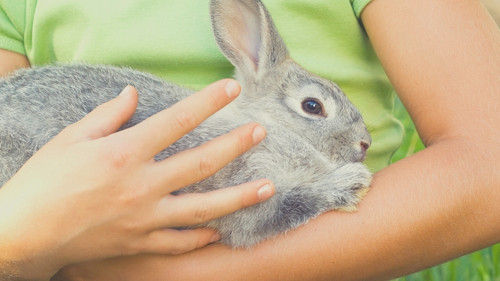
The bonding period with a new pet rabbit can take several weeks or even months. Making friends with a rabbit is not guaranteed to be a quick process – although it can be! But once you have built mutual trust with your bunny and it has accepted your home as its own safe domain, it will start to show its love for you. Your emotional support rabbit may lick your hand, rub its chin on you, head-butt you, or even grunt at you to ask for some love back.
7 – Rabbits Are Hilarious
I love how seriously rabbits take themselves. They’re so small, but brimming with personality.
When they flop down next to your chair, they’re claiming you as their safe space. When they run and perform their flying leaps of joy, they’re so enraptured that it looks like they hit the ground wondering what just happened. When they accidentally get water up their nose while drinking, they’ll fuss and fluster and seem to ask the water bottle, ‘how dare you do that to me!”
All of this makes them super entertaining to watch. There’s no guile in a bunny. Only genuine peace, energy, and a silly, hilarious nature.
That said, not every single rabbit has a good personality to become an emotional support animal. Call shelters before you adopt and discuss your need for a gentle companion rabbit.
Closing Thoughts
If you aren’t sold on getting a cat or dog as an emotional support animal, consider a rabbit.
Bunnies occupy a great middle ground between larger support animals, like cats and dogs, and small pets like rodents. Their needs are not quite as extensive as that of a larger animal, but they have rich personalities and can provide more comfort and companionship than a hamster or a guinea pig.


